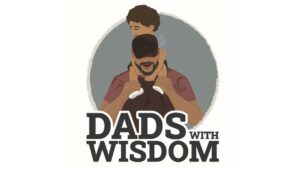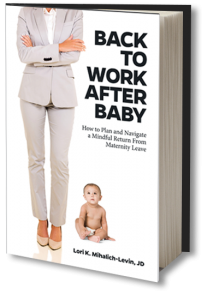 If you’re reading this blog and parenting a child with a new dad partner, you might be curious about what’s going on in this new dad’s brain. I believe a majority of the readers of this blog are moms. Which is why I think it’s so helpful to have an expert with us today to provide some dad-related insights.
If you’re reading this blog and parenting a child with a new dad partner, you might be curious about what’s going on in this new dad’s brain. I believe a majority of the readers of this blog are moms. Which is why I think it’s so helpful to have an expert with us today to provide some dad-related insights.
I’m pleased to welcome Adam Angel, LCSW, LICSW, to the Mindful Return blog to help explain and decode some of what the new dad in your life might be experiencing. Adam is a therapist and founder of a group program for dads called Dads with Wisdom. He has some important insights to share with you about the dad perspective.
************************************
I work with over 150 fathers a year in fatherhood support groups, therapy groups, and individual therapy. What these parents tell me – and that I’ve experienced first-hand in my own family – is that both mothers and fathers are suffering in supporting their children. What can we do to ease these parenthood strains? By working to create an agreed-upon approach to care that meets the needs of our children, ourselves, and our relationships, I’m hopeful that we can make headway in our challenges.
At some point during our dads group meetings, someone will mention a relational dilemma specific to their family system. Some of these comments sound like:
- “I feel like I am no longer a priority in my wife’s life. I can understand being number 2. But now I am number 6.”
- “I can’t even try to offer my opinion. She is just going to decide what the baby needs. But then I feel like I can’t complain, because I know how much she does in breastfeeding the baby.”
- “As soon as I do anything, I feel like she comes over to correct me.”
- “I encourage her to make time for herself, just as I am trying to make time for myself. But she tells me I am being selfish, because someone has to take care of the child.”
The above relational challenges often come alongside common new parent experiences that all parents face. These include, but are not limited to, identity change, loss of previous lifestyle and relationships, lack of sleep, trauma from the birth experience, and feelings of lack of connection to the baby. All of these can deepen emotional challenges in fathers.
The answers to these challenges are complex, because the causes are complex. There are of course the many structural challenges that are politically and culturally embedded into the current parental experience of many Americans. As part of the cultural reality there are the many unfair expectations of women, including the real and perceived pressure for parents to parent the “right” way. These messages are, by and large, directed at mothers.

As a response to the lack of support and ubiquitous cultural messaging, many parents try to parent to impossible standards, causing strain on themselves and their primary relationships. Parenting becomes the primary focus (over other relationships), and new parents quickly become overwhelmed. When this happens, fathers often wind up feeling disconnected, helpless, angry, and alone. These feelings are compounded by what dads have missed out on from their own life experiences.
At a time when many men are challenging the prevailing cultural notions of what being a father is, many still do not have a role model for how they’d like to parent. (This phenomenon is termed the ‘role model gap’). There are a few additional key factors that also cause strain in fatherhood, including:
- Many men have had little experience with infants and young children;
- Men generally have done a more limited exploration of their emotions; and
- A lack of deep support from other men
Some men react by disconnecting and distancing themselves, burying themselves in work, or by acting out in anger at themselves or others. Other men may overextend themselves and experience the overwhelm and anxiety more typically associated with women’s experiences in child rearing.
I believe that the best way forward is to provide a way for men to establish their own parenting path. How? By giving them space to learn and make mistakes. This necessarily means evaluating each parent’s own wants on a scale that includes the values of not just the child, but also each individual parent and the coparenting or couple’s relationship. Discerning, discussing and agreeing upon the care that you will jointly implement as parents is essential and protective to all three relationships (child, couple and relationship to self).
My hope is that a joint inquiry between parents will challenge cultural assumptions and expectations, cultivate understanding and empathy, and bring about further agency in each parent.
 Adam Angel is a licensed clinical social worker with 15 years of experience working with youth, adults, and families. His specializations include postpartum mood and anxiety disorders and developmental trauma. Adam completed his undergraduate at the University of Maryland and obtained his MSW at Howard University before working in the nonprofit world, where he facilitated a number of groups including groups for men. He lives in Silver Spring with his wife, two kids and their dog.
Adam Angel is a licensed clinical social worker with 15 years of experience working with youth, adults, and families. His specializations include postpartum mood and anxiety disorders and developmental trauma. Adam completed his undergraduate at the University of Maryland and obtained his MSW at Howard University before working in the nonprofit world, where he facilitated a number of groups including groups for men. He lives in Silver Spring with his wife, two kids and their dog.
Adam also invites you to join him at the Nurture Nook in Fairfax, Virginia for a free 1-hour discussion on how to “Bridge the Parenting Style Gap” on October 8, 2023 at 10am. If you would like to learn more about dads groups or bridging the parenting style gap community conversations, you can also reach out to Adam directly at adam@dadswithwisdom.com.
Want more practical tips on working parenthood? Check out my book, Back to Work After Baby: How to Plan and Navigate a Mindful Return from Maternity Leave



